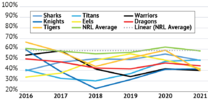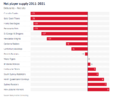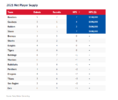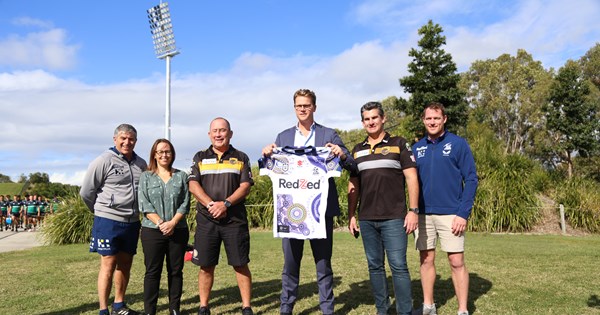The salary-cap proposal that could revolutionise the game
April 13, 2022 — 5.31am
The Sydney Roosters would be considered a development club and be rewarded with salary-cap relief under a radical proposal that promotes the blooding of more rookies – and less player churn – across the game.
The initiative is the brainchild of Ramy Haidar, a sports management consultant who previously worked with Manly coach Des Hasler. Haidar has pitched his “Net Supply Allowance” idea to the NRL and some of its most powerful clubs.
The paper has received positive feedback from clubland and comes at a time when head office is considering new ways to reward development clubs ahead of collective bargaining discussions with the players’ union.
Under the proposal, clubs are rewarded for blooding debutants rather than signing players who have established themselves at NRL rivals.
Sides are rewarded with salary-cap relief according to a “team purity score”, a metric that is derived by comparing the total number of club appearances against total NRL appearances, showing what proportion of a side’s experience was played in its team colours.
In 2021 for instance, Newcastle had 1824 games of experience across their roster, but only 755 of those caps made their debut for the Knights.

More broadly, over the past decade the Roosters have blooded 45 rookies and bought just 38 established first-graders from other clubs, to provide a surplus of seven. As a means of comparison, the Sharks have debuted 34 while importing 55 players over the same period.
Under Haidar’s matrix, teams would receive $50,000 for each player supplied in surplus, meaning the Roosters would be entitled to cap relief averaging $100,000 per season – the most of the 16 clubs – between 2012-2021.
The Dragons, meanwhile, would receive only $15,000 after notching the lowest “Net Player Supply” score over the corresponding period.
“Unsurprisingly, the main gripe amongst fans is also the high quantity of player transfers,” Haidar’s document states.
“When new recruits enter a roster, that team’s identity gets somewhat diluted. As clubs shuffle through more imported talent, their rosters become just one generic blend of footballers …
“Concerningly, seven out of the 16 clubs had a team purity below 50 per cent in season 2021. The overall NRL average was just 58.4 per cent reflecting exactly how often players are shuffling from one club to another. The unintended consequence of this is diminished opportunities for new talent to debut. Imported players fill roster spots and often take selection priority.

Clearly, too many teams develop too few of their own. They lack the organic flavour that fans crave, making it difficult to sell the team as authentic.”
Haidar declined to comment when contacted by the
Herald.
Under his plan, a player does not have to be a local junior to be defined as a rookie. For instance, Sam Walker and Joseph Suaalii would count as Roosters rookies because they made their first-grade debut for the Tricolours, despite spending time in other junior systems. It’s why clubs such as the Roosters and the Storm, with only a small catchment of local juniors, aren’t disadvantaged. Like the other sides, they would be incentivised to promote those already within their system rather than simply buying over the top of them.
Modelling off the past decade reveals the entire strategy would have cost only an additional $49,687 per club, a relatively small price to pay to promote from within and slow the constant churn of players across the competition.

“The root source of team identity is the blooding of rookies,” the document states. “So, when teams recruit high quantities of players, they inadvertently block pathways for their internal rookies. It is an unintended consequence but has long-term implications on the purity of their roster …
“Across the last decade, 766 existing first-graders were recruited. Yet in the same period only 666 rookies were debuted. The deficit of 100, indicative of a dependent culture whereby some clubs prefer to import the finished product rather than offer opportunities to their own … Ultimately, the selection of debutants benefits the entire NRL regardless of their origin.”

